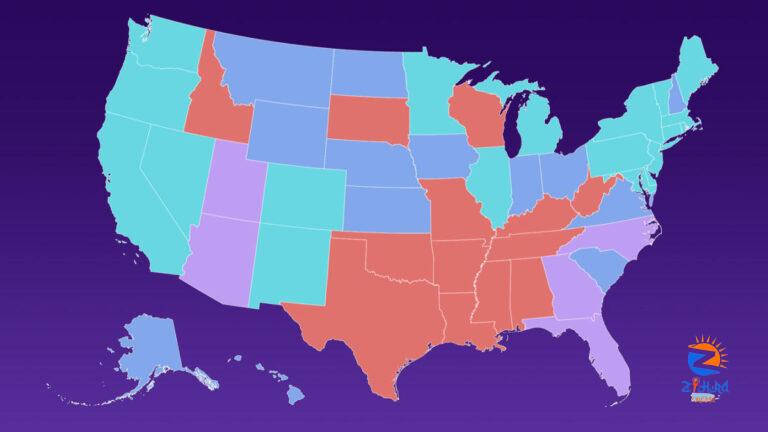
[ad_1]
Florida’s Republican governor, Ron DeSantis, made national headlines when he signed a bill late Thursday night that will outlaw abortion in the state after six weeks of pregnancy. The new law is just the latest in a string of strict restrictions on abortion passed by individual states since Roe v. Wade was overturned by the Supreme Court in June 2022.
Prior to the Supreme Court ruling in Dobbs v. Jackson Women’s Health Organization that overturned Roe, 18 Republican states across the South and West, such as Alabama, Idaho, Mississippi and South Dakota, passed so-called “trigger laws,” which outlawed abortion the moment the court handed down its verdict. But in recent months, six other Republican-led states, including Florida, have enacted new laws that outlaw abortion at various stages of pregnancy.
Here is a guide to the new abortion restrictions states have passed since last summer:
Florida
The new law, which comes on top of a law DeSantis signed last year banning all abortions after 15 weeks of pregnancy, without exceptions, would ban abortions after six weeks except for victims of rape or incest or for women whose health is at risk, who would be required to produce evidence. The new law will take effect only if the existing 15-week ban is upheld by the state Supreme Court in a current legal challenge. The state’s top court has a conservative majority.
Indiana
The Hoosier State became the first in the country to create new abortion restrictions after the Dobbs decision. In August 2022, Gov. Eric Holcomb, a Republican, signed a bill that banned abortion, with limited exceptions. Abortions are now permitted in Indiana only in cases of rape and incest in the first 10 weeks of pregnancy, in order to protect the pregnant woman’s life or physical health, or if a fetus is diagnosed with a lethal anomaly. Doctors who provide illegal abortions are to be stripped of their medical license. Abortions can also now be performed only in hospitals or outpatient centers owned by hospitals — abortion clinics are no longer legally able to operate in the state. Enforcement of the new law, however, has been blocked pending the outcome of legal challenges. The Indiana state Supreme Court heard oral arguments in the case in January.
West Virginia
Last September, West Virginia Gov. Jim Justice, a Republican, signed a law banning abortion except in cases of rape or incest for up to eight weeks of pregnancy for adults and 14 weeks for minors. It allows abortions of a nonviable fetus or embryo, and when there is a medical emergency or an ectopic pregnancy. Providers of abortions not covered by those exceptions face up to 10 years in prison.
South Carolina
The state had a 2021 trigger law similar to the measure DeSantis just signed in Florida — it banned abortion after cardiac activity can be detected in a fetus, at around six weeks of pregnancy — but the state Supreme Court overturned that law in January, saying that it violated the state constitution. So, in February, the state Senate passed a bill that its Republican majority hoped would pass muster with the court: a ban on abortion after six weeks, but one that now allows for abortions to be performed up to 12 weeks of pregnancy in cases of rape, incest, fatal fetal anomaly and when the patient’s health is at risk. The state House of Representatives, however, passed an even more restrictive law, which would ban abortion from the moment of conception, with limited exceptions. The two houses are at odds, and the stalemate has left the state’s current ban on abortion after 20 weeks in effect for the time being. A bill in the state House to treat abortion as homicide, potentially punishable by the death penalty, is also under consideration, although nine of its original 24 GOP co-sponsors dropped their support last month.
Wyoming
In March, Wyoming became the first state to ban abortions conducted via oral medication, which account for a majority of abortions nationwide. The state already had a full abortion trigger ban on the books, but it is currently enjoined by court order from enforcing it. The same abortion pill is at the center of federal lawsuits, as a Trump-appointed federal judge in Texas recently overruled the FDA’s approval of the drug.
Idaho
Earlier this month, Idaho became the first state to criminalize helping a minor get an abortion in another state, with persons convicted of breaking the law facing two to five years in prison. The law allows the state attorney general to prosecute a case if local prosecutors decline to do so. It also allows family members of a pregnant child or the person who impregnated her to file lawsuits against medical professionals who provide her abortion care, with up to $20,000 for damages.
[ad_2]